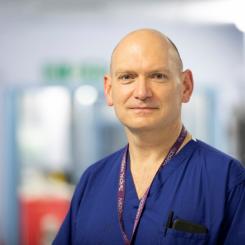Mr Dirk Strauss
The UK arm of this international clinical trial will be conducted at eight specialist sarcoma units across the UK
Awarded: £50,000
Duration: 36 months
Some types of retroperitoneal sarcoma are particularly aggressive, with a high risk of death in the years after treatment, so better options are needed for patients.
The EORTC STRASS II trial is a multi-national phase 3 clinical trial taking place in ten European countries, the UK and a collaboration with multiple specialized sarcoma centres in Australia, Canada and North America, investigating treatment options for this sarcoma. Sarcoma UK is contributing to the UK arm of this trial, providing vital collaborative funding to support this important international trial.
The challenge
Retroperitoneal sarcomas affect the abdomen and make up 15% of all soft-tissue sarcomas. They are challenging to diagnose and aggressive, which makes them difficult to treat. Some subtypes, such as high-grade dedifferentiated liposarcoma and leiomyosarcoma, are particularly high-risk, with a 70% risk of spreading to the rest of the body 5 years after treatment. There is a clear need for new and better treatments for retroperitoneal sarcoma, which is generally treated with just surgery alone.
How will this project tackle this challenge?
The first trial of its kind, the EORTC STRASS II trial aims to investigate the impact of delivering chemotherapy to these high-risk sarcoma patients before surgery. This is a randomised trial, meaning that patients recruited will be randomly split into two groups. Half of the patients recruited will receive just surgery to treat their cancer, while the other half will receive three cycles of chemotherapy, and then surgery 3-6 weeks later.
The main aim of the trial is to see if giving patients chemotherapy before their surgery will improve the chances of survival. Other aims include preventing the sarcoma spreading to other parts of the body, preventing the sarcoma coming back after the patient has recovered, and improving the patients’ quality of life.
What this means for people affected by sarcoma
These high-risk cancers urgently need new and better treatments. Understanding the difference in effectiveness between different types of treatment will mean that clinicians can work to identify the best treatment options for retroperitoneal sarcoma patients.
About the EORTC
The European Organisation for the Research and Treatment of Cancer (EORTC) is a non for profit organisation, which unites clinical cancer research experts, throughout Europe, to define better treatments for cancer patients to prolong survival and improve quality of life. Spanning from translational to large, prospective, multi-centre, phase III clinical trials that evaluate new therapies and treatment strategies as well as patient quality of life, its activities are coordinated from EORTC Headquarters, a unique international clinical research infrastructure, based in Brussels, Belgium. For further information, please visit the EORTC website: www.eortc.org
This project is our 2020 Roger Wilson Research Award, awarded to one research each year in recognition of Sarcoma UK’s founder.
These high-risk cancers urgently need new and better treatments. Understanding the difference in effectiveness between different types of treatment will mean that clinicians can work to identify the best treatment options for retroperitoneal sarcoma patients.













